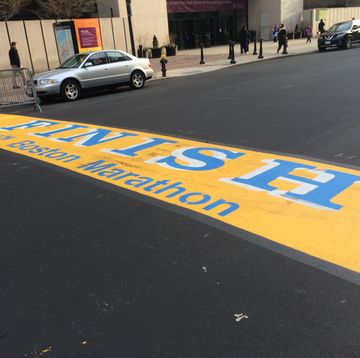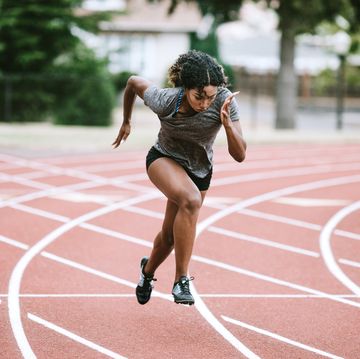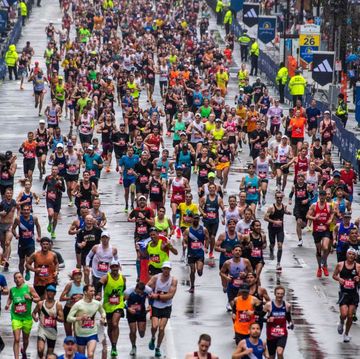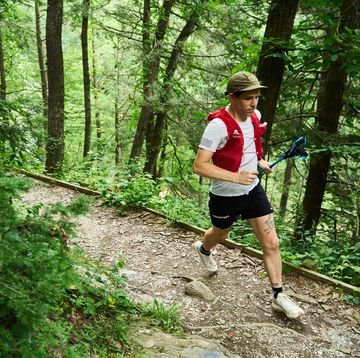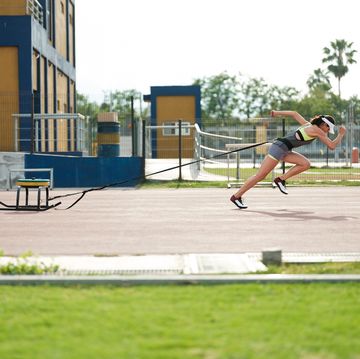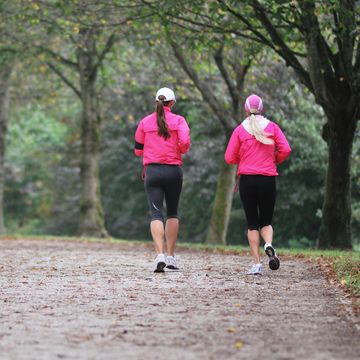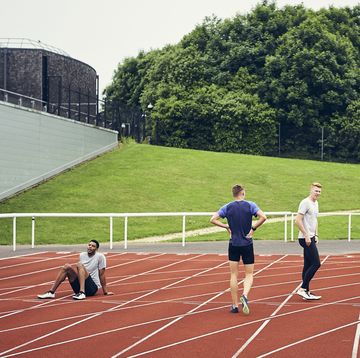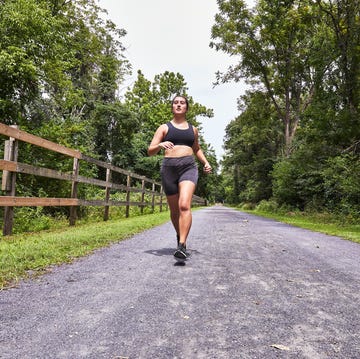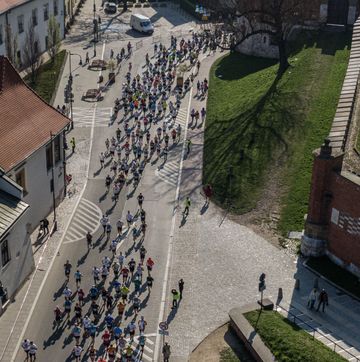Three years ago Iowa State’s Betsy Saina was an unheralded runner, following in the pack behind her teammate Lisa Koll (now Lisa Uhl and an Olympian at 10,000m). Saina ran at the 2009 NCAA cross country championships and finished 141st in 21:35.
Three years later, she has improved her 6K time by two minutes — and everyone is following behind Saina. In her final year of eligibility, Saina took the top spot at this year’s NCAA championships in a time of 19:27.9, holding off Dartmouth’s Abbey D’Agostino and Oregon’s Jordan Hasay and in a furious kick at the finish. Saina has also received the Honda sports award for cross country.
Although Iowa State was expected to contend for a podium spot, the Cyclones mustered only an 11th place finish, but Saina continues to have a positive outlook for her team. She knows how a poor race (she DNFed at the 2011 outdoor championships 10K) can motivate a runner to come back stronger.
Running Times: How did it feel when you ran across the finish line and hit the tape first?
Betsy Saina: I knew from the beginning it was going to be a tough race, because those girls are so good. There were at least five girls I knew who were tough like me. I was just hoping I’d be the first girl across. My goal all along was to get the national title for cross country. Going there I was just trying to avoid pressure. I just went there and when I saw that finish line I knew it was going to be tough, because there were four of us. Then at 50 meters to go we are still three, 30 meters to go we are still three. I was like, “It’s now time. Who’s going to take this?” When I was closing in on the finish line it felt really good. It was really exciting being the first one.
RT: Would you have been disappointed if you hadn’t placed first?
BS: Alphine [Tuliamuk-Bolton of Wichita State], Jordan and me, we were all seniors and Abbey still has one season to go. I need the title, Alphine needs the title, Jordan needs the title. I had just told myself to be flexible, my goal was to win the title, but if I were to lose it, I knew it was because I did my best and I’d be fine with it. I’d be frustrated a little bit, but still you’d feel like you did all that you had to do.
RT: How has your life changed since you won the title? Are you getting a lot of attention?
BS: Right now I’m trying to avoid attention from outside, because I still have my eligibility for the track season and the NCAA rules don’t allow us to get exposure outside, because I’m still a student. I’m just trying to stick with school and stick with my coach. I’m trying not to be over-confident. I need to make wise decisions right now. Right now it’s just so exciting. Right now I feel like everything is going really well so I’m just appreciating everything and waiting to see what I can do for the coming season.
RT: You’ve been acknowledged at Iowa State University basketball and football games. What’s it like for thousands of people to be cheering for you?
BS: It’s amazing. That’s when you realize how much people care about what we are doing as student-athletes. I remember at the football game there was 50,000 people there and everyone was just shouting and clapping and when I was walking out everyone was giving me fives and people were really excited. You never know how many people are cheering for you when you are racing and stuff, but when you go to the basketball or football games, that’s when you realize how many people are surrounding you. You get people from outside supporting the school; they don’t care where you come from, they are just like, “We are proud of you, Betsy.” It’s just something that made me feel like I’m in a place where people do care and do appreciate what we do. It was just really encouraging to do better.
RT: After the race were you able to talk to your parents in Kenya?
BS: Honestly, where I grow up, people know Kenya is a place where many people like running, but I grew up in a place when I was training I’d go early in the morning at like 5 in the morning where people couldn’t look at me when I was running. I grew up in a fairly remote area where people don’t know about running. In my village [Kaptagat] I am the only girl in the United States and the only person running. My parents have no idea. Even if I call my parents and say, “I won the race.” They are like, “Good job,” but they don’t really know what’s going on. I think I took like three or four days before calling. I said, “Oh, I won the NCAA cross country title,” and they said, “Oh, good job!” But that’s all. It’s not like here. But when they think about college they don’t think about the impact of running in college. My dad was excited, but they didn’t take it the way I took it. Because I feel like it was a big honor. But I don’t blame my parents, because they don’t have any idea.
RT: Who was the first person you saw after crossing the finish line that congratulated you?
BS: Meaghan [Nelson]. When I finished the line I saw Meaghan coming, the first thing she said was, “How did it go?” Because she was behind me. I told her I won the race. She gave me a big hug and you could tell she was really excited.
RT: Iowa State was projected to have a podium finish and it didn’t work out that way. Do you have any insight as to what happened on race day?
BS: It was really, really frustrating. We’d been talking about it for the whole season and we wanted to win the title or get to the podium. It’s something you can’t change, but everyone was really sad. It was hard, but the girls are going to be back next year, they’re only losing me and Meaghan. Being frustrated, it will help these girls. Everyone was feeling sad for our coach. But if you don’t see someone getting that frustrated, that’s someone who doesn’t care. But our coach was really frustrated about it, because he really cares. He knew we could have done way better than what we did. Not getting into top three or top five is so frustrating, but it’s helping these girls to fix things, and sit down and talk about what they’re going to do next year. It helps to think about what went wrong and what to fix for next year. We are having a meeting next week with the whole team and I think that will help us and we are going to figure out what exactly went wrong. They’re giving everyone time to think about it. I think it’s going to help this program. Maybe the pressure made us not able to get top three.
RT: Do you think it had anything to with inexperience in your No. 3 to No. 5 girls?
BS: I don’t know. It’s something we haven’t figured out yet. I don’t know went wrong. Maybe we were too much excited about it. Sometimes nationals is a place where you can make predictions, but at the same time there’s a lot going on when you go to the national course. It’s something that we just need to sit down and think about it and talk about it. Maybe we can find the answer as to why.
RT: You won because you outkicked everyone else. What do you do in your training to build such a strong finishing kick?
BS: Being here I ended up getting very good training, because my coach always says, “I know you can do this,” but he didn’t know I was going to win the race with less than 400 meters to go. Coach knows me, he knows I can win the race, but not waiting until the last to kick. Jordan is a 1500-meter runner, so it’s very difficult to beat someone like her — she’s tough. My kick has just been developing for the last two years. Getting the kick is not something that just comes. It’s not like, “Oh I’ll train today and then tomorrow I’ll outkick everyone.” We’ve been working on my speedwork, and I think my kick has come from my speedwork, but also from doing something for a long time. My coach could tell I was improving over time, but he wasn’t sure I had that kick to win with only 100 meters to go. I don’t know where it came from.
RT: Can you be a little more specific about your speedwork?
BS: I’m the kind of person who needs to do something really fast in my workouts to race really well. I do my 200s separate and Meaghan also does her 200s separate. The way we do our 200s is different. I do mine really, really fast and take a little longer recovery. She does slower, but shorter recovery. I try to start with 33, 34s then get down to 32, 31s with my 200s. Sometimes I take about 50 to 55-second breaks, but it depends. When I finish my 200s I keep jogging until I start the 200 again.
I usually do about 8 to 10-mile tempos with the whole team for the cross country season. It’s not like we run really hard, we just run the way we feel it. For my long runs, I try to go as easy as possible, but I go longer. So I’ll run 17 miles in two hours.
RT: Are you running the 10,000 again this year? What are your goals for this track season?
BS: Right now I just want to focus on indoor, because that’s what’s coming next. How I know I’m going to run for the 10K is after how I run the 5K indoor season. Right now it’s just get ready for the indoor, see what I can do with it, and then after that I will decide what I can do for the 10K. But honestly, I hope I can do better than what I did last year. I like when I improve even just a little bit every semester.
RT: Do you think your training is going to be different now that Coach Ihmels knows you can out kick people right at the end?
BS: The good thing with my coach and what I like so much is that we never change things. Why change something if it’s working really well? All we are doing right now is getting back to the same thing. Sometimes running isn’t all about the training, but from your mind. So it’s about getting back to the training and to trust myself. I did this at the nationals. That helps me a lot when I run. If I did that at the nationals for cross country why am I not doing that for track? Let me just go and face the girls, I know everyone is tough, but I just need to be prepared mentally. We’re not going to change anything, because it’s working really well.
RT: What are your future plans? You ran the Kenyan Olympic trials, so do you see yourself four years from now being at that trials again?
BS: I’m hoping everything will go well. The world championships are next year. My goal right now is to finish my college career really great. I’m someone when I do something, it helps me to get ready for the next one. If I have a really good season for the track indoor and outdoor then I’ll be ready to go to Kenya and face those girls for the world championship trials. Last year I went there with no experience at all. It was my first time going to Kenya and racing the Olympic trials. It was my first time putting myself out there with really, really good girls. When I came to the United States I was someone who was running like 17:35 for the 5K. It makes me think for my future, like sometime I’m going to go there and I’ll be able to face them.
RT: The 2013 world championships trials for Kenya are in late June. Will that interfere with the NCAA outdoor championships in early June?
BS: The NCAA nationals will be June 5, I want to finish the NCAA and then go back home and try the World Championship trials.
RT: Is your goal to peak at the world championships then?
BS: I want to finish the NCAAs really, really well. It means a lot to me, because it’s my last season of my college career. I want to be in my best shape to end my college career doing something really, really great. The world championships are just going to be like any other thing. If this is what I want to do then I need to start exposing myself to it.
RT: Are you going to live and train in Kenya? Or after the world championships are you going to come back and train in the U.S.?
BS: I have no idea yet. I’m basically just trying to focus with what I’m doing right now. Sometimes when you try and focus on which one to do, especially when it’s a very hard transition to make, like do I go back to Kenya or do I need to stay here? Right now I am just focusing on the training and seeing what I can do. After that I’ll finally get a decision with what I’m supposed to do. You can’t really decide now what to do.
RT: What is your major and do you see yourself doing anything with that major?
BS: My major is Child, Adult and Family Services. You could just say public health, because that’s what I’m going to do. Getting here I had no idea what to do in college. I look back home at what other people are doing, like my older brother. He is doing occupational therapy and I always get motivated with what he is doing in health back home. I hope when I graduate and go to Kenya then I can see what I can do to help those people. When I sit back and see what I am doing I do not want to be the only person enjoying what I am doing. I want to motivate other people. Especially where I come from. You can find my colleagues who I was in high school with, they are just sitting at home; they have nothing to do. Even if I’m staying here to train, I will be going home and seeing what I can do to help people and then coming back here.
RT: Any specific ideas about that?
BS: I want to motivate people to know that it’s not just about running. Especially in Kenya – some people don’t know that running and college goes together. I want people to know that after high school, you’re not supposed to just run. I want people to know you need to go to college. I’m just trying to let people know that running and college is way better than someone who is just running. You can do something apart from running, because you’re not going to run forever.
RT: Do you see yourself always running the 10K or would you move up to the marathon?
BS: I didn’t even know I was going to run the 10K. I came here and I was thinking, “My race is just the 5K.” But getting here I ended up getting amazing training. My coach told me, “I think you could run good in the 10K.” So it was like my freshman year and I started running the 10K. I didn’t know I was going to run it the whole time. After two years I thought, “Oh, I’m a good fit to run the 10K.” But hopefully I can finish my career with the marathon. But I don’t see myself running the marathon now.
RT: In the past your teammates have described you as having a good sense of humor and how funny you are. How does that play a role in your training?
BS: Sometimes I don’t even know that I said something that was really funny. I grew up having a lot of jokes with friends. Running sometimes is really stressful. Or maybe there’s something wrong and something going on with your personal life. Sometimes it’s not running, but something else that you are dealing with. I try to do something that makes people laugh. Sometimes I just need to forget about running. It helps me to get back to the same moods and makes me really happy.
RT: What advice would you give to your teammates that are a little down about the cross country season to help them?
BS: I have a lot of experience with that. Sometimes there’s something that you do that you can’t change. We’re not going to change nationals. It’s gone and we are number 11. I had an experience in 2011, where I was second in the NCAAs for the 10K in 2010. So coming back to 2011, I was expected to win the national title. But then I didn’t finish the race. It hit me really bad. And I think that’s where the team is; I understand the frustration. It took me like a month. I was really frustrated. I cried a lot. I couldn’t get it out of me for like a month. I had to stop running for like a whole month. But then I realized it’s only to get worse if I keep thinking, “Oh, I didn’t finish the race.” It’s not going to change things. So I hope the team knows it happens. It’s a sport. Everything can happen in running. Sometimes they can go the way they are expected to. In 2011, I went to the line thinking, “I am already the champion.” With five laps to go I passed out. But if I wouldn’t have had that in 2011, I wouldn’t be doing what I’m doing now. When you use the past to challenge yourself, it helps you to get better. You’ve got to accept it and challenge it. I have a lot of hopes for them. They are still really good.


